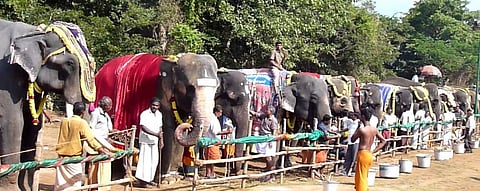A unique rejuvenation camp in Tamil Nadu for captive elephants
According to Hindu cosmology, it is believed that mighty elephants support and guard the Earth. The deity Vinayaka or Ganesha, with the body of a human and the head of an elephant is one of the most popular gods in the Hindu pantheon.
Elephants are featured in different Hindu religious practices. In Kerala, elephants are used in temple festivals. Many temples in the state possess their own elephants.
Elephants are also owned by some temples in neighbouring Tamil Nadu for use during religious ceremonies and other festivals. Many private individuals also own elephants and feature them in temple festivals and other functions.
Of the 29,000 elephants in India, about 2,500 are captive. But these animals are often not given proper diet and due care. As a result, they become aggressive and cause problems every now and then. Animal rights activists have protested the unfair and abusive treatment of the pachyderms.
With a view to providing these captive animals a new lease of life, former Tamil Nadu chief minister, the late J Jayalalitha, organised an annual rejuvenation camp for a period of 48 days for the elephants owned by temples and other religious institutions in the state.
The camp was initially organised at Theppakadu in Mudumalai, Nilgiris district, in 2003, 2004-05, 2005-06 and 2011-12.
As Theppakadu is quite far away, the venue was subsequently shifted to Thekkampatti near Mettupalayam on the banks of the Bhavani river from 2012 onwards.
The camp is organised by the Hindu Religious and Charitable Endowments (HR & CE) department. Generally, the camp commences in December and concludes at the end of January, after a period of 48 days. The cost of Rs 1.5 crore for organising the event is borne by the state government.
The camping arrangements are made by the forest department. A six-acre piece of land within the reserve forest is provided with electric fencing all around, to avoid any possible intrusion by wild elephants.
Eight watch towers have been erected for monitoring the camp. Foresters, forest guards and anti-poaching personnel are deputed for regular monitoring and inspection of the camp. Necessary vehicles, torch lights, walkie-talkies and fireworks have been supplied to the officials by the HR & CE department.
Twenty-eight elephants participate in the camp. Of these, 21 are from various temples and five are from mutts. Two are from the temples of Puducherry.
Now, the facility has been extended to the captive elephants of the forest department as well. Twenty-seven each in the Mudumalai Tiger Reserve and Anamalai Tiger Reserve, two each in Chadivayal elephant camp of Coimbatore district and Arignar Anna Zoological Park in Chennai and four elephants in the Tiruchirappalli elephant rehabilitation centre attend the camp at their respective locations.
The trained elephants were used in early years for timber operations by the forest department. Now, as the forests have been declared as ‘Protected Areas’, the timber operations have been suspended completely.
Currently, the elephants are used to drive away wild elephants that stray into farmlands and human habitations. They are also used for elephant safaris and for patrolling activities inside reserve forest areas.
During the rejuvenation camp, the pachyderms are given complete rest, in addition to being provided with fruits, vegetables, sugarcane, plantain, horse gram, ragi, rice, salt, jaggery, vitamin tonics, mineral mixtures, etc.
A dedicated team of veterinary doctors and other assistants from the animal husbandry department is posted to monitor the health of the animals. The camp not only provides rest but also rejuvenation to the elephants both physically and mentally. Citizens are also allowed to watch the camping activities like feeding and training.
The elephants are diagnosed by the veterinary doctors and based on their recommendations, the concerned mahouts and kavadis take care of the animals round the clock.
The rejuvenation camp has helped the elephants overcome stress developed during captivity. Minor health problems faced by the elephants routinely are also taken care of.
In addition to health care and nutritious food, the elephants are given a good shower and a brisk walk twice daily for improving their health.
Animal lovers and the caretakers of the elephants are strongly in favour of such camps as the pachyderms are made to undergo health screening and treatment for different ailments and other infections.
In Kerala, a month-long annual rejuvenation camp for captive elephants owned by private individuals is being conducted under the name ‘Aanayoottu’.
The Kanha Tiger Reserve of Madhya Pradesh too organises an annual rejuvenation camp for captive elephants. Such rejuvenation camps should also be organised in other states that have captive elephants, to help the jumbos to relieve the stress and to maintain good health.


